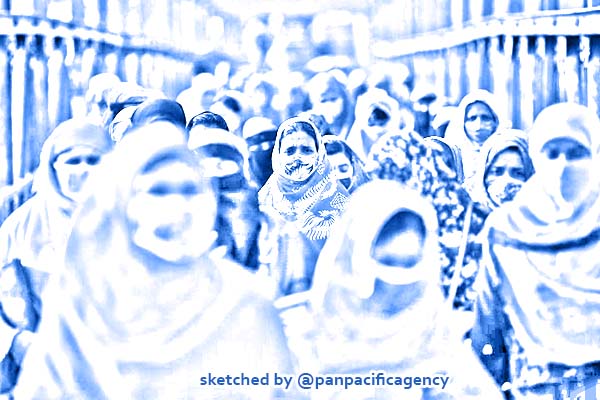[Analytics] How to stay safe indoors post-lockdown

Bangladeshi garments industry workers are more worried about their income than about coronavirus. REUTERS. Sketched by the Pan Pacific Agency.
Staying home and maintaining social distancing have been the pivotal measures to control Covid-19 transmission across communities since the pandemic hit the world. Kohinur Khyum Tithila specially for the Dhaka Tribune.
As the general holiday is not going to expand anymore in Bangladesh, workplace and large commercial places have to come up with new strategies to prevent transmission, because new study shows people are more likely to get infected by Covid-19 in closed environments than in open-air environments.
A study conducted by scholars from Japan in April found that the primary transmission of Covid-19 was 18.7 times greater in a closed environment compared to an open-air environment.
The study titled — Closed environments facilitate secondary transmission of coronavirus disease 2019 — concludes: “It is plausible that closed environments contribute to secondary transmission of Covid-19 and promote superspreading events.
“Our findings are also consistent with the declining incidence of Covid-19 cases in China, as gathering in closed environments were prohibited in the wake of the rapid spread of the disease.”
Risk of infection in a closed environment is higher as those are poorly ventilated; however, it can be reduced if people change their way of interaction, and follow health guidelines specially wearing masks when indoors.
Additionally, authorities should consider a little renovation in certain areas of the workplaces and enforce mandatory health guidelines for the employees.
Preparing the post-lockdown workstations
The government of Bangladesh will probably call off the general holiday permanently and both public and private offices have to operate regularly on weekdays.
Experts fear that people might get infected in workspaces and factories, if they do not strictly follow the health guidelines like wearing masks, washing hands, and keeping distance between two people even when they are indoors.
Maintaining social distance indoors is way different from maintaining social distance outdoors and in public places. The offices need to operate very differently than they did before the general holiday.
Virologist Dr Nazrul Islam of the Bangabandhu Sheikh Mujib Medical University (BSMMU) told Dhaka Tribune since the government has decided to call off the general holiday, people need to watch out for themselves.
All employers should ensure to keep a minimum of three feet distance from each other. Moreover, wearing masks indoors should be made mandatory for every single person in a workplace, he added.
Nobody should sit facing each other because droplets generated during speech can transmit the virus from an infected person to a healthy person.
“Respiratory viruses can be transmitted via droplets generated by sneezing or coughing. However, normal speaking could also produce droplets and infect a person in close proximity,” said Dr Nazrul.
Former International Centre for Diarrhoeal Disease Research, Bangladesh (icddr,b) research fellow Dr Shahriar Rozen, currently working as a senior policy lead for Alberta Ministry of Health, Canada, said that companies and organizations should continue with the work from home policy until the transmission rate falls.
“Now, we know that working from home is a feasible option for those who can,” he said, adding some professionals can work from home without disrupting the daily work flow.
Redesigning the work environment at garment factories
Garments factories need to be extra careful because numbers of garment workers work in closed environments and a significant number of people in Dhaka city work as garment workers.
Infectious disease specialist Farhad Uddin Hasan Chowdhury Maruf of Dhaka Medical College Hospital (DMCH) suggested that garment factories could run in three shifts – morning, evening, and night – to avoid crowding.
He said that the garment factory authorities can divide the employees in different groups in each shift and select a different entry time for each group.
“If one group joins work at 7am, another group can join work at7:15am. Factories and roads will remain less crowded in this way,” he said.
He added that it is the responsibility of the garment factory owners to ensure masks for the employees and provide hand sanitizers and soaps in the factories.
Covid-proofing restaurants is difficult, order food at home instead
While restaurants are resuming their regular services, people should avoid eating out at their favorite restaurants as it would require them to take their mask off inside the restaurant.
Dr Nazrul strongly recommends not to go to restaurants until the transmission rate slows down because people cannot eat with their masks on.
” I do not see any urgency to open restaurants and I do not understand why people need to eat out during a pandemic,” he said in vexation.
If people want to enjoy restaurant food or support restaurant business during this pandemic, they should order foods instead, he added.
If people need to go to restaurants anyway, the least they could do is not sit across or too close to another person while eating out.
Restaurant staff, particularly those who wait tables, need to strictly follow the health guidelines like wearing a mask properly and sanitizing hands as much as they can.
Bangladesh is showing no sign of flattening the curve as the number of Covid-19 positive cases rise with each passing day.
On Sunday, Bangladesh witnessed the record highest coronavirus deaths in a single day, as 40 more people died and the total number of deaths rose to 650. The total number of cases in Bangladesh reached 47,153 on the same day.